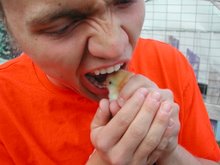I intend to earn a MLA in
Gastronomy. Through that program I will hone skills that will enable
me to help people realize the crucial part that food plays in their
lives and by so doing shift public perception and policy toward a
healthier understanding and lifestyle. I feel that my experience and
education in food, writing, and philosophy give me a unique approach
to food studies that is tailor-made for entering the Gastronomy
program:
As a child, I was raised in
an environment where food was a central part of life. My mother, a
life-long certified master gardener and canner, always raised,
prepared, and preserved most of the food eaten in my family. I raised
flocks of chickens, cordoned off sections of the family garden for my
personal use, and prepared elaborate, over-the-top lunches for myself
nearly every day as a child. Like many young males, my initial
interest in food was purely a matter of volume consumption. Having
grown up surrounded by high-quality food, I simply loved eating. I
can still recall sitting at my Italian great-grandmother's rice farm,
eating seconds and thirds of recently-scavenged pheasant roadkill
scraped off the nearby county road 39. That roadkill could be as
magnificently prepared is still a matter of some wonder.
As I matured, my interest in
food followed suit. I began to appreciate quality food for what it
was, rather than simply a great way to stuff myself silly. I began to
understand the beauty of fresh tomatoes at the eclectic local farmers
market, the tenuous balance of local ecosystems, (for instance, how a
couple extra wolves in the valley could be disastrous to FFA kids
trying to raise a herd of goats) and how my involvement in a Montana
AERO sustainability group could actually make a difference in curbing
the spread of our tenacious, all-present enemy, turkish knapweed.
Sliding loose change into a large mason jar to pay for our weekly
gallon of fresh milk from our neighbors' cow inculcated in me the
idea that food could be wonderful, natural, and economically viable.
As I attended Brigham Young University,
my understanding of food underwent yet another transformation. As I
studied philosophy, in particular the work of continental thinkers
such as Martin Heidegger and Maurice Merleau-Ponty, I developed a
passion for what is often called “philosophy of the ordinary.”
This philosophy asserts that by seeking to comprehend and examine our
everyday experiences with mundane things, we can more fully
understand their crucial role in structuring out lives. Through these
studies, frequent semi-pretentious food nights and cheese tastings
among close friends, and a semester abroad studying food and culture
in Europe, my understanding of food added a layer of complexity. I
began to understand food as something philosophically and culturally
meaningful in addition to being so tasty and beautiful.
This interest has not since waned. As I
continue to study the state of food in our country and the world, I
am convinced that it is one of the most pivotal issues of modern
society. Reading the works of philosophers such as Albert Borgmann
and Hans-Georg Gadamer as well as searching out books about food and
society has helped me to realize that all of my experiences in food -
my love of fresh and local; my deep appreciation for food and its
grounding role in community, family, and tradition; and my
fascination with food's oft-ignored place in philosophy – come
together to form a character-defining interest in food to which I
plan to devote my professional, academic, and personal life. The MLA
in Gastronomy from Boston University strikes me as the perfect
program to propel me further in my studies and toward my professional
goals.


1 comment:
Looks good, dude. I hope all goes well!
Post a Comment